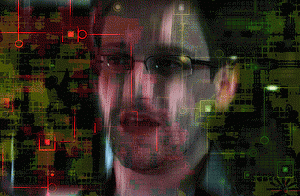This piece was reprinted by OpEd News with permission or license. It may not be reproduced in any form without permission or license from the source.
Source: Fresno Bee
WASHINGTON -- Edward Snowden is a courageous American hero and will be remembered as one long after the "war on terror" is replaced by some other pretext for violating Americans' constitutional rights and the rest of the world's national sovereignty, privacy and, sometimes, security.
He won his first major legal victory on Dec. 16 when a federal District Court ruled that the NSA's collection of Americans' phone records that Snowden first exposed was probably unconstitutional.
It's unfortunate that even most of the critical reporting on our national surveillance state still frames the abuses that Snowden revealed as a result of over-zealous efforts to protect Americans from terrorism.
Even ignoring the industrial espionage and phone-tapping of foreign leaders like German Chancellor Angela Merkel or Brazilian President Dilma Rousseff that obviously had nothing to do with terrorism; the surveillance state at home is much more than a violation of our privacy.
Don't get me wrong: that's bad enough. Most people don't want to share the intimate details of their personal lives with government snoops. But the Obama administration has managed to convince some of the more naive among us that the NSA's big data sweeps just sit in some huge storage facility that are sifted with algorithms to identify or investigate targets that may have something to do with terrorism.
However there is a mountain of evidence that this massive data-gathering is in fact being used against citizens who are involved in constitutionally protected activity, such as political organizing and public education.
The American Civil Liberties Union has a nice compilation of U.S. law enforcement agencies "spying on American citizens and infiltrating or otherwise obstructing political activist groups" in 36 states in recent years.
From spying on anti-war groups like Pittsburgh's Thomas Merton Center, to infiltrating groups across the country who were planning to protest at the 2004 Republican convention, our government has plenty of additional resources to use the NSA's data for discouraging and disrupting opposition political activity.
In 2011, the Boston police, the federally funded Boston Regional Intelligence Center and the FBI were very busy tracking activists who were part of the Occupy movement, Code Pink, and Veterans for Peace.
As a result they seem to have ignored the intelligence that was literally handed to them about the terrorists who bombed the Boston Marathon in April. This tells you a lot about the priorities of our morally corrupt national surveillance state.
"These programs were never about terrorism," wrote Snowden in a letter to Brazilians on December 17, noting they are really about "economic spying, social control and diplomatic manipulation. They're about power."
Back when Martin Luther King Jr. was inspiring millions in the struggle for civil and voting rights for African-Americans and for economic justice, the FBI was busy tapping his phone and harassing him.
At one point they tried seriously to blackmail King into committing suicide. Today they would have a constant flow of real-time information not only on his every move and phone call, but on every activist in that movement across the country. That is the difference that technology makes, if we let them get away with it.
The surveillance state is also making the U.S. into a banana republic, as the burgeoning military-intelligence apparatus becomes more powerful relative to our elected officials, including the President.
It was the wounded military-intelligence community's priorities that got the Obama administration to threaten China, Russia and Latin America, and violate all sorts of international laws in a futile attempt to force their co-operation in capturing Snowden. And it is their power that is currently blocking reforms to rein in the NSA's abuses.
It's not just our privacy that is disappearing because of the abuses that Snowden exposed -- it's the foundations of a democratic society.






